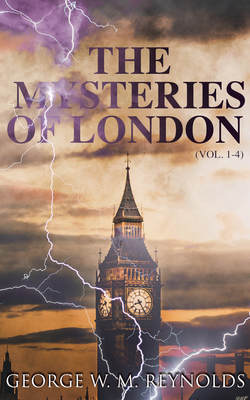Читать книгу The Mysteries of London (Vol. 1-4) - George W. M. Reynolds - Страница 20
На сайте Литреса книга снята с продажи.
CHAPTER XIII.
THE HELL.
ОглавлениеTable of Contents
AFTER having taken a few turns in Regent-street, the baronet observed "that it was devilish slow work;" Mr. Talbot suggested the propriety of "a spree;" and Mr. Chichester declared "that as his friend Markham was anxious to see life, the best thing they could all do was to drop in for an hour at No. ——, Quadrant."
"What place is that?" demanded Markham.
"Oh; only an establishment for cards and dice, and other innocent diversions," carelessly answered Chichester.
The Quadrant of an evening is crowded with loungers of both sexes. Beneath those arcades walk the daughters of crime, by ones and twos—dressed in the flaunting garb that tells so forcibly the tale of broken hearts, and blighted promise, and crushed affections—to lose an hour amidst the haunts of pleasure and of vice, and to court the crime by which alone they live. The young men that saunter arm-in-arm up and down, and the hoary old sinners, whose licentious glances seem to plunge down into the depths of the boddices of those frail but beauteous girls, little think of the amount of mental suffering which is contained beneath those gay satins and rustling silks. They mark the heaving of the voluptuous bosom, but dream not of the worm that gnaws eternally within:—they behold smiles upon the red lips, and are far from suspecting that the hearts of those who laugh so joyfully are all but broken!
Thus is it that in the evening the Quadrant has a characteristic set of loungers of its own:—or, at least, it is frequented after dusk by a population whose characters are easily to be defined.
A bright lamp burnt in the fan-light over the door of No. ——. Mr. Chichester gave a loud and commanding knock; and a policeman standing by, who doubtless had several golden reasons for not noticing anything connected with that establishment, instantly ran across the road after a small boy whom he suspected to be a thief, because the poor wretch wore an uncommonly shabby hat. The summons given by Mr. Chichester was not immediately answered. Five minutes elapsed ere any attention was paid to it; and then the door was only opened to the small extent allowed by a chain inside. A somewhat repulsive looking countenance was at the same time protruded from behind the door.
"Well?" said the man to whom the countenance belonged.
"All right," returned Chichester.
The chain was withdrawn, and the door was opened to its full extent. The party was thereupon admitted, with some manifestations of impatience on the part of the porter, who no doubt thought that the door was kept open too long, into a passage at the end of which was a staircase covered with a handsome carpet.
Chichester led the way, and his companions followed, up to a suite of rooms on the first floor. These were well furnished, and brilliantly lighted; and red moreen curtains, with heavy and rich fringes, were carefully drawn over the windows. Splendid mirrors stood above the mantels, which were also adorned with French timepieces in or molu, and candelabra of the same material. On one side of the front room stood a bouffet covered with wines and liquors of various descriptions.
In the middle of that same front apartment was the rouge et noir table. On each side sate a Croupier, with a long rake in his hand, and a green shade over his eyes. Before one of them was placed a tin case: this was the Bank;—and on each side of that cynosure of all attention, stood little piles of markers, or counters.
Two or three men—well but flashily dressed, and exhibiting a monstrous profusion of Birmingham jewellery about their persons—sate at the table. These were the Bonnets—individuals in reality in the pay of the proprietor of the establishment, and whose duties consist in enticing strangers and visitors to play, or in maintaining an appearance of playing deeply when such strangers and visitors first enter the room.
The countenances of the croupiers were cold, passionless, and totally devoid of any animation. They called the game, raked up the winnings, or paid the losings, without changing a muscle of their features. For all that regarded animation or excitement, they might have been easily passed off as automatons.
